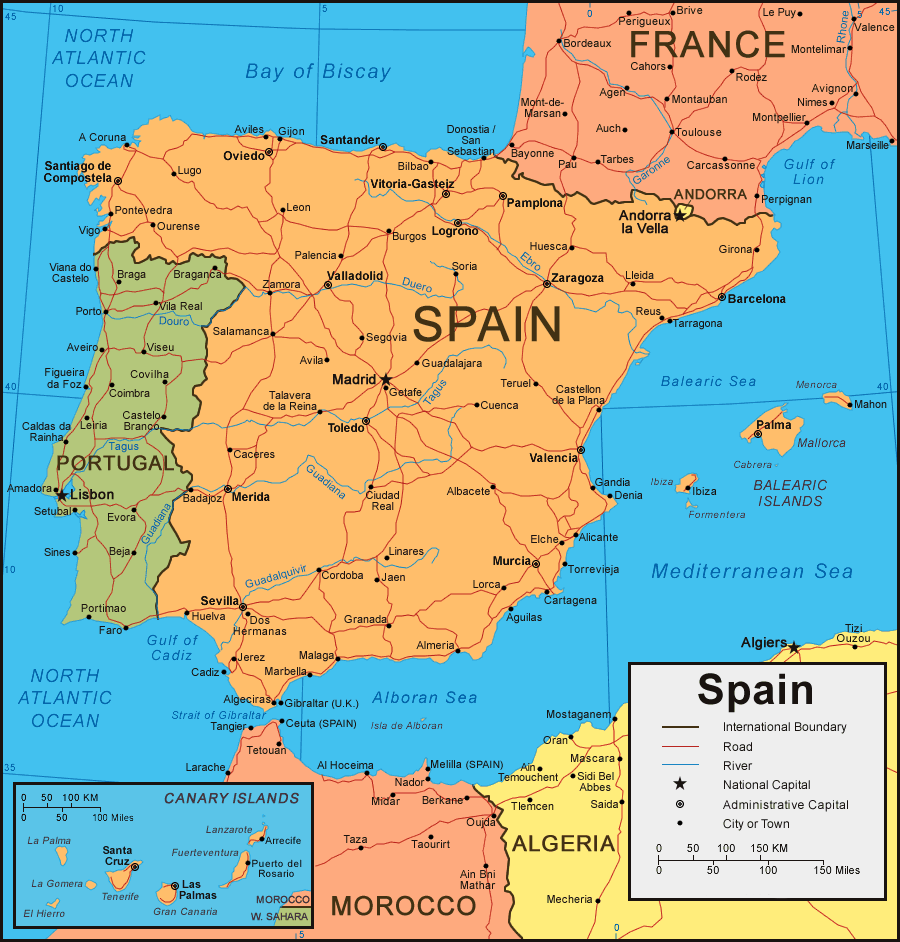International Relations
Cooperation and Mutual Assistance in Customs: India-Spain
- 07 Jan 2022
- 6 min read
For Prelims: India-Spain Mutual Assistance in Customs, European Union, FDI, location of Spain and the neighbourhood.
For Mains: Significance of India-Spain Relations in European Union and way forward.
Why in News
Recently, the Union Cabinet has approved an Agreement between India and Spain on Cooperation and Mutual Assistance in Customs Matters.
Key Points
- About:
- It is a legal framework for sharing of information between the Customs authorities of the two countries.
- It helps in the proper administration of Customs laws and detection and investigation of Customs offences and the facilitation of legitimate trade
- Provisions:
- The correct assessment of customs duties, especially information pertaining to the determination of the customs value, tariff classification and the origin of the goods.
- Customs offence concerning illicit movement of the following:
- Arms, ammunition, explosives and explosive devices.
- Works of art and antiques, which are of significant historical, cultural or archaeological value.
- Toxic materials and other substances dangerous to the environment and public health.
- Goods subject to substantial customs duties or taxes.
- New means and methods employed for committing Customs offences against Customs legislation.
- Significance:
- It will help in making available, reliable, quick and cost-effective information and intelligence for the prevention and investigation of Customs offences and apprehending of Customs offenders.
India Spain Relations
- About:
- Relations between India and Spain have been cordial since the establishment of diplomatic relations in 1956. The first resident Ambassador of India was appointed in 1965.
- The first state visit to Spain by an Indian head of state was paid by the then President in April, 2009.
- The 11th round of the JCEC (Joint Commission on Economic Cooperation) meeting was held in Madrid in January 2018.
- In order to give an impetus to trade and investment relations, India-Spain Joint Commission on Economic Cooperation (JCEC) was set up under the 1972 Trade and Economic Cooperation Agreement and has since met ten times.
- Economic and Commercial Relations:
- Spain is India´s 7th largest trading partner in the European Union.
- Bilateral trade in 2018 (Jan - Dec) stood at USD 6.31 billion, growing by 8.68%over a similar period a year ago.
- India's exports grew by 8.49 % and stood at USD 4.74 billion while imports grew by 8.49 % and stood at USD 1.571.39 billion.
- Indian exports to Spain include organic chemicals, textiles and garments, iron and steel products, automotive components, marine products and leather goods.
- Spain is the 15th largest investor in India with cumulative FDI (Foreign Direct Investment) stock of USD 1.43 billion (in January 2000), mostly in infrastructure, renewable energy, auto components, water desalination and single brand retail.
- Cultural and Academic Relations:
- Cultural exchange is an important component of India-Spain bilateral relations. Casa de la India (Homestead ) was founded in 2003 as a platform for the promotion of India and Spain and Indo-Spanish relationships in the field of culture, education, cooperation and enterprise.
- ICCR (Indian Council for Cultural Relations) sponsored exhibitions ‘Religions of India’ and ‘Streams of India’ were also hosted in different Spanish cities in 2015.
- The first International Day of Yoga (21th June, 2015) witnessed participation by over 1200 Yoga enthusiasts in a mega Master Class in the iconic Plaza de Colón followed by a Conference on Yoga.
- The ICCR and Casa de la India and with support of the Embassy of India, launched an Indo-Spanish theatre co-production titled ‘Flamenco India’.
- Indian Diaspora:
- The Indian community forms a very small percentage of the immigrant population of Spain.
- Among the Asian communities, the Indian Diaspora is the third largest group, after Chinese and Pakistanis.
- The earliest Indian settlers were Sindhis who came from the subcontinent at the end of the 19th century and settled in the Canary Islands.
- According to Spanish statistics, the resident Indian population in Spain has gone up from 9000 in 2001 to 34761 as of 2015.
- Bilateral Agreements:
- Agreement on Trade and Economic Cooperation (1972)
- Agreement on Cultural Cooperation (1982).
- Civil Aviation Agreement (1986).
- Double Taxation Avoidance Agreement (1993).
- Bilateral Investment Protection and Promotion Agreement (1997).
- Extradition Treaty (2002)
- MoU on Institutionalisation of Political Dialogue (2006)
Way Forward
- In order to continue building relations of greater trust and cooperation on the basis of which Spain and India can become closer allies in the international context, both governments should continue to commit to a more ambitious and imaginative strategy focused on the political, commercial and cultural aspects that offer the prospect of generating comparative advantages.
- Cooperation in the tourist sector with Spain offering leading expertise to its Indian counterparts and enhancing the role of the migrant population of both countries, especially the well-established Indian community in Spain, are two additional key dimensions of the bilateral partnership.
- The development of this relationship should also be backed by greater cooperation within the framework of the bilateral relations between the EU and India.





